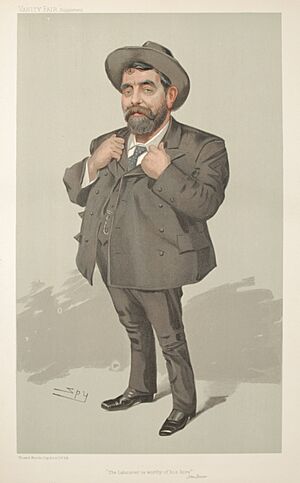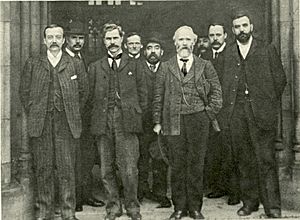Will Crooks facts for kids
William Crooks (born April 6, 1852 – died June 5, 1921) was an important trade union leader and politician from Poplar, London. He was also a member of the Fabian Society, a group that believed in making society fairer. William Crooks is especially remembered for working hard to fight poverty and inequality.
Contents
Growing Up in Poplar
William Crooks was born in Poplar, London, in 1852. His father, George, worked on ships. When William was only three, his father had an accident and lost an arm. His mother, Caroline, became a seamstress to support the family. Money was very tight. In 1861, William and four of his siblings had to go to the Poplar workhouse for a short time. A workhouse was a place where poor people could live and work, but conditions were often very hard. This experience deeply affected William and made him want to fight poverty.
William went to a school for poor children. He started working young, first as a grocer's errand boy, then as a blacksmith's helper, and later as an apprentice cooper (someone who makes barrels). William loved to read. He learned about people like Richard Cobden and John Bright who wanted to make society better. His co-workers often asked him to speak up about their tough working conditions. Because he spoke out, he was fired for being a "political agitator." He stayed a member of the Coopers Union from 1867 until he died.
Becoming a Union Leader
After working for a short time in Liverpool, William Crooks came back to London. He found a job in the docks. He became very good at speaking to crowds outside the East India Dock gates. He also started giving talks about politics. His strong speaking skills helped raise money for 10,000 striking dockers during the 1889 London Dock Strike.
Earlier that year, Crooks joined the London County Council as one of the first labor members. He was part of the Progressive Party. Later, he became the first working-class chairman of the Poplar Board of Guardians. This group was in charge of helping the poor. With help from his friend George Lansbury, Crooks worked to improve the local workhouse. He made it a model for other places that helped the poor.
Improving Local Life
As a well-known local politician, William Crooks helped make many improvements in his area.
- In 1895, he officially opened Island Gardens, a park in the Isle of Dogs.
- He also pushed for the building of the first Blackwall Tunnel, which goes under the River Thames.
- As chairman of the London County Council's Bridges Committee in 1898, he helped create the Greenwich and Woolwich foot tunnels. These tunnels allowed people to walk under the river.
A Labour Politician
In 1900, William Crooks became the first Labour mayor of Poplar. Two years later, he was elected to Parliament as the MP for Woolwich. He won this election by a huge amount, taking the seat from the Conservative Party. This win happened because the Labour Representation Committee and the Liberal Party worked together. At the time, he was only the fourth Labour MP ever.
Working for Change in Parliament
As an MP, William Crooks always remembered his working-class background. He worked hard for many important changes:
- He campaigned for workers to get pensions (money paid regularly after retirement).
- He supported changes to limit the power of the House of Lords, which was the upper house of Parliament.
- He supported a bill in 1905 to help people who were unemployed.
- He also supported his wife's efforts to get women the right to vote.
Crooks was re-elected in 1906. He supported the Liberal governments that were making many reforms. He lost his seat in Parliament in January 1910 but was re-elected in December 1910.
In 1911, he disagreed with the Trades Union Congress about a bill related to labor disputes. In 1912, he supported a bill about people with learning difficulties. As a member of the Metropolitan Asylums Board, he helped increase the age until which the Board had to care for people with developmental disabilities from 16 to 21. He also improved the teaching and training for those in their care.
World War I and Retirement
When World War I started in 1914, William Crooks led the House of Commons in singing the national anthem. Unlike some other Labour Party members who were against the war, he supported the government's efforts. In 1916, he was part of a group of Labour MPs who formed the British Workers League, which supported the war. He later left this group. In the 1918 election, he was re-elected without anyone running against him for the new Woolwich East area.
William Crooks stayed an MP until his health made him retire in February 1921. He died four months later in the London Hospital. He was buried in Tower Hamlets Cemetery.
William Crooks's Legacy
William Crooks left a lasting mark:
- In 1930, one of the Woolwich Ferry boats was named after him.
- A housing estate in his hometown of Poplar is still named after him.
- A road in Eltham, near Woolwich, also bears his name.
Images for kids
-
Memorial stone at Tower Hamlets Cemetery
 | Kyle Baker |
 | Joseph Yoakum |
 | Laura Wheeler Waring |
 | Henry Ossawa Tanner |







